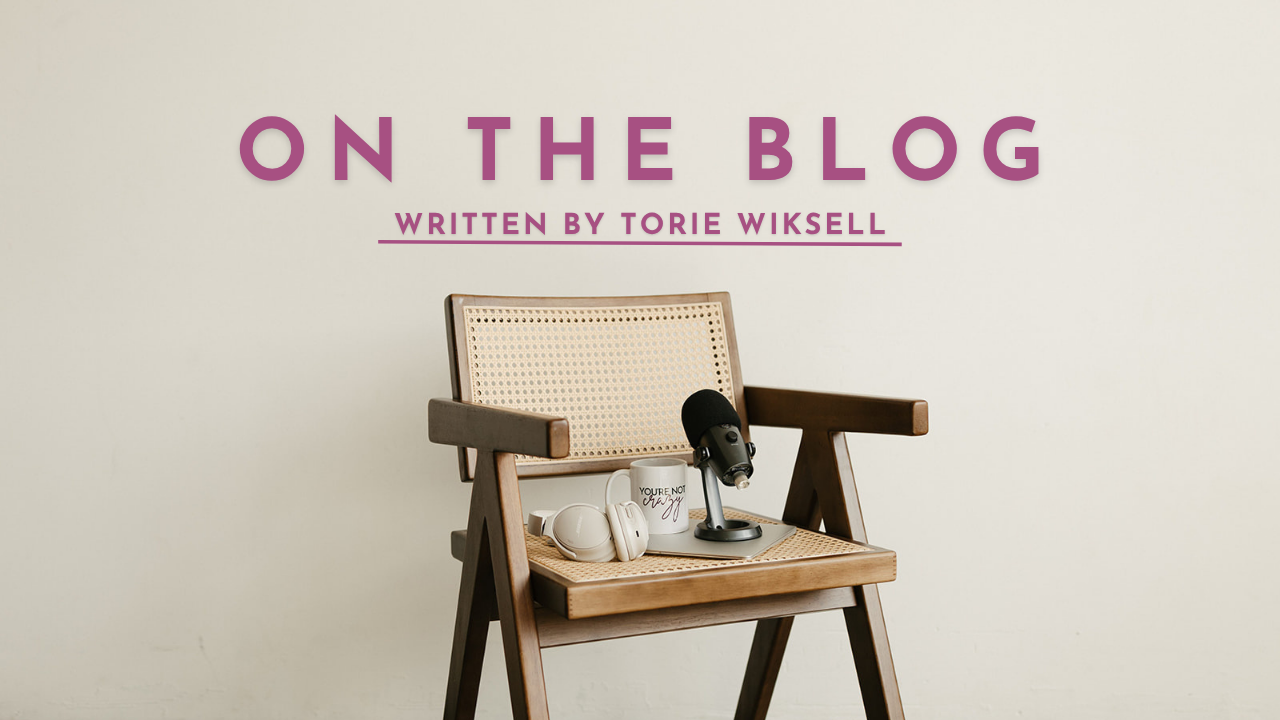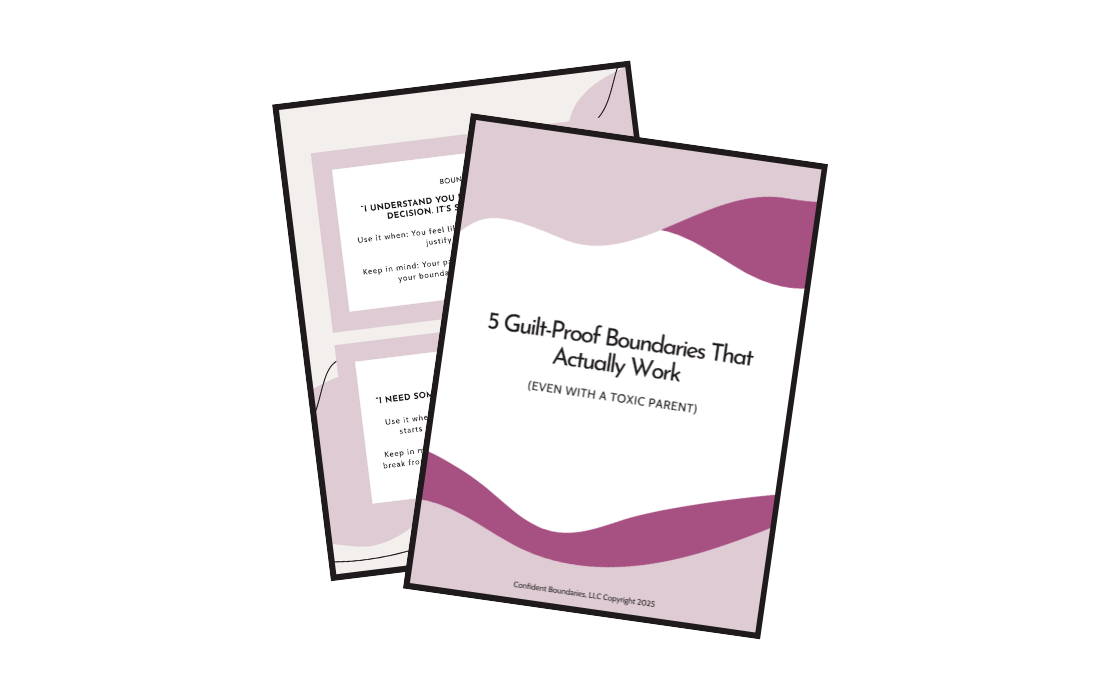
Setting Boundaries With Parents: A How-To Guide (Especially When They’re Toxic)
Let’s just go ahead and say the quiet part out loud:
Yes, your parent is probably lying to their therapist.
And yes, setting boundaries with a parent who has borderline or narcissistic personality disorder (BPD or NPD) is every bit as hard as it feels.
These dynamics are messy. They’re emotionally exhausting. And no matter how many times you’ve tried to set boundaries, you probably still walk away feeling guilty, second-guessing yourself, and wondering, am I the problem?
Spoiler alert: you’re not.
You’re navigating a dysfunctional family system with an emotionally immature parent who likely never respected boundaries in the first place.
So no, it’s not you. It’s the dynamic. And luckily—you can change the way you show up in it.
What “Setting Boundaries” Actually Means
Setting boundaries with a toxic parent isn’t just about saying no or limiting contact.
It’s about reclaiming your emotional space.
It’s about refusing to keep shrinking yourself to manage someone else’s feelings.
It’s about learning to prioritize your peace—even if it makes someone else uncomfortable.
But let’s be real: when your parent has untreated BPD or NPD, setting boundaries often feels like stepping into a minefield. Because once you try, you’ll usually be met with:
-
Guilt-tripping
-
Rage
-
Silent treatment
-
Or that classic line: “After everything I’ve done for you…”
If that sounds familiar, you're not alone. And you're not doing it wrong.
You just need support, a strategy, and tools that were actually made for this kind of family dynamic.
Why Traditional Therapy Doesn’t Always Cut It
Let me be blunt: most therapists aren't trained for this.
Most therapists don't have the knowledge and training to recognize personality disorders and the complex layers of navigating a relationship with someone who has a personality disorder. They may assume your parent is "doing the work" by going to therapy. They may give your parent the benefit of the doubt because they don't understand the subtle underlying messages.
If your parent is going to therapy (a big if) they might be there to:
-
Complain about how they've been wronged
-
Paint themselves as the victim
-
Or collect shiny new “therapy language” to use against you
(Yes, “gaslighting” and “boundaries” can be weaponized. I wish I were kidding.)
Traditional talk therapy is not appropriate for someone with a personality disorder (especially BPD and NPD). And, if your parent is doing therapy that isn't appropriate for them, chances are things are going to get worse-not better.
If you’ve been working on yourself for years and nothing in your relationship with your parent has changed—that’s not on you. It’s the mismatch between what traditional therapy was built for, and what you’re actually dealing with.
Setting Boundaries with a Toxic Parent (or a Parent You Suspect Has Borderline or Narcissistic Personality Disorder)
This is exactly why I created my workshop, How to Set Boundaries That Stick (Even with a Toxic Parent)—it's a roadmap for adult children of toxic parents who are ready to stop feeling stuck and start setting boundaries that actually stick.
Inside, I walk you through:
- The secret to framing your boundary so your parent is more likely to respect it
- How to manage guilt, fear, and anxiety so you don’t freeze or backtrack when setting boundaries
- Steps for enforcing your boundary when your parent pushes back—no more doubting yourself
And the best part? It accomplishes all that in less than an hour! You can sign up here.
Let’s Talk About the Guilt
One of the hardest parts of setting boundaries is what comes after—the guilt.
That voice in your head that says:
-
“Maybe I’m being too harsh”
-
“Maybe I should just let it go”
-
“Maybe I’m making this a bigger deal than it is”
That voice is not your truth.
That voice is conditioning—the result of growing up with a parent who taught you that their needs came first, always.
Here’s what I want you to remember:
Feeling guilty doesn’t mean you’re doing something wrong.
It means you’re doing something new.
Guilt isn’t a stop sign. It’s a growing pain.
And the more you learn to sit with it (without obeying it), the easier it gets.
And Hey, Sometimes You Just Have to Laugh
Look—dealing with toxic parents is heavy.
Sometimes, the only way through it is to step back, shake your head, and laugh at the absurdity of it all.
Like when your parent calls you manipulative—for asking not to be yelled at.
Or when they demand an apology for “hurting their feelings” by taking space to breathe.
If that sounds familiar, you’re in the right place.
You don’t have to take it all so seriously. You don’t have to carry all the weight.
And you definitely don’t have to do it alone.
The Bottom Line: You’re Allowed to Set Boundaries (Even if They Don’t Like It)
Setting boundaries with parents—especially emotionally immature, controlling, or manipulative ones—isn’t about being cruel. It’s not about “cutting people off.”
It’s about finally deciding your peace matters just as much as theirs.
Whether your boundaries look like:
-
Taking a break from phone calls
-
Refusing to engage in circular arguments
-
Saying no without explanation
-
Or going fully no-contact
You are allowed.
You are not the problem.
You are allowed to stop bending yourself into pieces just to keep someone else comfortable.
And you’re allowed to have support as you do it.
Ready for Tools That Actually Work?
This is exactly why I created the Confident Boundaries Membership—and the $149 Boundaries Workshop that’s helped dozens of cycle breakers like you learn how to stop backtracking, stop panicking, and finally hold the line.
If you’re ready for support that gets it, start here:
-
Watch the Workshop – How to Set Boundaries That Stick (Even With a Toxic Parent)
-
Join the Membership – Tools, coaching, and community built for adult children of toxic parents
-
Download the Free Guide – 5 Boundaries That Actually Work With Toxic Parents
You’re Not Crazy.
But you might have been gaslit by your parents.
Learn how to recognize the signs—and start rebuilding trust in yourself.
I hate SPAM. I will never sell your information, for any reason.



